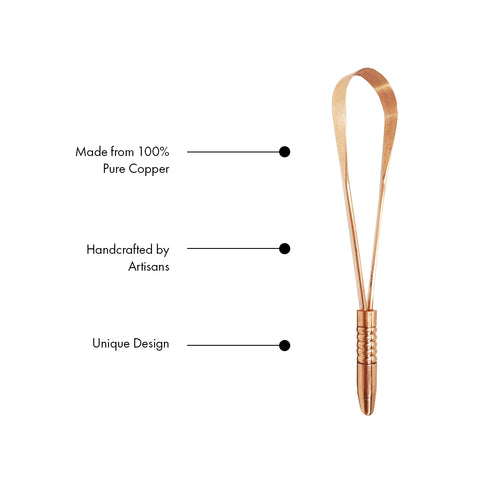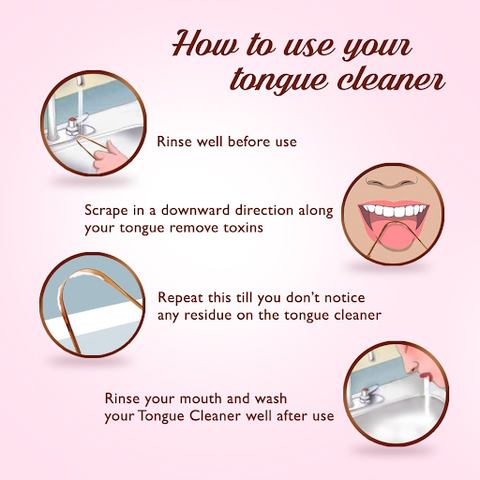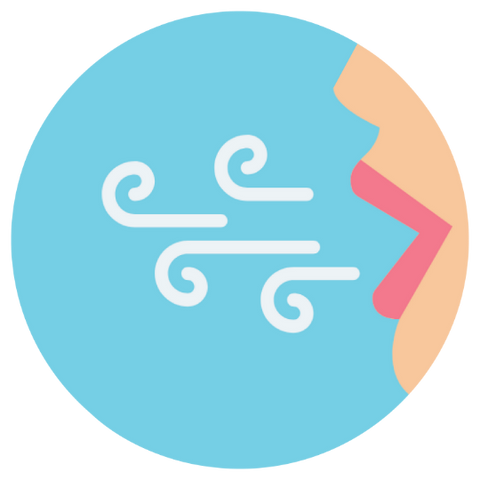Do you brush your teeth twice a day, floss regularly, and use a mouthwash? If yes, then you are doing a great job of taking care of your oral health. But did you know that there is one more thing that you can do to improve your oral hygiene and prevent bad breath? That is, using a tongue cleaner to clean your tongue.
In this blog post, we will explain what a tongue cleaner is, why you should use it, how to use it correctly, and what are the best practices for tongue cleaning. We will also address some common issues that you may face when using a tongue cleaner and how to solve them. By the end of this post, you will be able to enhance your oral hygiene routine with a tongue cleaner and enjoy the benefits of a cleaner, fresher, and healthier mouth.
Key Takeaways
- Using a tongue cleaner can enhance your oral hygiene routine and prevent bad breath, as it removes bacteria, food debris and toxins from the surface of your tongue.
- Tongue cleaning with a copper tongue cleaner offers additional benefits, as copper is a natural antimicrobial agent that kills harmful bacteria and has anti-inflammatory properties.
- Regular tongue cleaning can improve your sense of taste, boost your immune system, and prevent oral health problems such as tooth decay and gum disease.
- To use a tongue cleaner correctly, rinse your mouth and tongue cleaner, place the tongue cleaner at the back of your tongue, scrape from back to front, rinse after each scrape, and dry and store the tongue cleaner properly.

What is a Tongue Cleaner?
A tongue cleaner, also known as a tongue scraper, is a simple device that is designed to remove the bacteria, food debris, dead cells, and toxins that accumulate on the surface of your tongue. These substances can cause bad breath, plaque buildup, tooth decay, gum disease, and other oral health problems if left untreated.
A tongue cleaner can be made of different materials, such as plastic, metal, or wood. However, one of the most popular and effective types of tongue cleaners is the copper tongue cleaner. Copper is a natural antimicrobial agent that can kill the harmful bacteria on your tongue and prevent them from growing back. Copper also has anti-inflammatory properties that can soothe your tongue and prevent irritation.
A copper tongue cleaner is usually shaped like a U or a V, with two handles at the ends. It is easy to use and can fit any size of tongue. You can find copper tongue cleaners online or at your local health store.The Undeniable Benefits of Using a Tongue Scraper
Using a tongue scraper regularly can provide you with many benefits for your oral health and overall well-being. Here are some of the tongue cleaner benefits that you can enjoy:
- Eliminate bad breath: One of the main causes of bad breath, or halitosis, is the accumulation of bacteria and sulphur compounds on your tongue. These substances produce a foul odour that can affect your confidence and social interactions. By using a tongue scraper, you can remove these substances and freshen your breath. Studies have shown that tongue scraping is more effective than brushing alone in reducing bad breath .
- Improve your sense of taste: Your tongue is covered with tiny bumps called papillae, which contain taste buds that allow you to perceive different flavours. However, when your tongue is coated with a layer of bacteria and debris, your taste buds can become dull and less sensitive. This can affect your enjoyment of food and your appetite. By using a tongue scraper, you can clear your tongue and restore your sense of taste.
- Boost your immune system: Your tongue is the first line of defence against germs and infections that enter your mouth. However, when your tongue is dirty, it can harbour harmful bacteria and toxins that can weaken your immune system and make you more susceptible to illnesses. By using a tongue scraper, you can remove these bacteria and toxins and strengthen your immune system.
- Prevent oral health problems: Your tongue is connected to your teeth and gums, and the bacteria and plaque that form on your tongue can also affect your dental health. If left untreated, these bacteria and plaque can cause tooth decay, cavities, gum disease, and other oral health problems. By using a tongue scraper, you can prevent these problems and maintain your dental health.
As you can see, using a tongue scraper can provide you with many benefits that can improve your quality of life. But how do you use a tongue scraper correctly? In the next section, we will show you how to use a tongue cleaner step by step.

How to Use a Tongue Cleaner: Step-by-Step Guide
Using a tongue cleaner is very easy and takes only a few minutes. Here are the steps that you need to follow to use a tongue cleaner correctly:
- Rinse your mouth and tongue cleaner: Before you start, rinse your mouth with water to moisten your tongue and remove any loose particles. Also, rinse your tongue cleaner with water to clean it and make it ready for use.
- Stick out your tongue and place the tongue cleaner at the back of your tongue: Gently stick out your tongue as far as you can and place the tongue cleaner at the back of your tongue, as close to the throat as possible. Make sure that the tongue cleaner covers the entire width of your tongue and that you are comfortable with the position.
- Scrape your tongue from back to front: Apply gentle pressure and scrape your tongue from back to front, moving the tongue cleaner along the surface of your tongue. You may need to do this several times, depending on the amount of coating on your tongue. Make sure that you reach all the areas of your tongue, including the sides and the centre.
- Rinse your mouth and tongue cleaner: After each scrape, rinse your mouth with water to remove the bacteria and debris that you have scraped off. Also, rinse your tongue cleaner with water to clean it and prepare it for the next scrape. Repeat this process until your tongue is clean and free of coating.
- Dry and store your tongue cleaner: Once you are done, dry your tongue cleaner with a clean towel and store it in a dry and hygienic place. You can also disinfect your tongue cleaner with boiling water or alcohol once in a while to keep it germ-free.
Best Practices for Tongue Cleaning
To get the most out of your tongue cleaning routine, here are some best practices that you should follow:
- Use a tongue cleaner every day: To maintain your oral hygiene and prevent bad breath, you should use a tongue cleaner every day, preferably in the morning and before going to bed. This will help you remove the bacteria and toxins that accumulate on your tongue overnight and throughout the day.
- Use a copper tongue cleaner: As we mentioned earlier, a copper tongue cleaner is one of the best types of tongue cleaners that you can use. Copper has antimicrobial and anti-inflammatory properties that can kill the harmful bacteria on your tongue and soothe your tongue. Copper also does not rust or corrode, making it durable and safe to use.
- Use gentle pressure and avoid scraping too hard: When using a tongue cleaner, you should use gentle pressure and avoid scraping too hard or too fast. This will prevent you from injuring your tongue or causing bleeding or pain. If you feel any discomfort or sensitivity, stop and adjust the pressure or the position of the tongue cleaner.
- Use a natural mouthwash after tongue cleaning: After using a tongue cleaner, you can use a natural mouthwash to rinse your mouth and further freshen your breath. You can make your own natural mouthwash by mixing water with salt, baking soda, apple cider vinegar, or essential oils. These ingredients can help balance the pH of your mouth, neutralise the odour, and fight the bacteria.

Troubleshooting Common Issues When Using a Tongue Scraper
Using a tongue scraper is generally safe and easy, but you may encounter some common issues when using it. Here are some of the issues and how to solve them:
- Your tongue is too sensitive or sore: If your tongue is too sensitive or sore, you may find it difficult or painful to use a tongue scraper. This could be due to various reasons, such as tongue injuries, infections, allergies, or vitamin deficiencies. To solve this issue, you should consult your doctor or dentist and treat the underlying cause of your tongue sensitivity or soreness.
- Your tongue bleeds when using a tongue scraper: If your tongue bleeds when using a tongue scraper, you may be scraping too hard or using a tongue scraper that is too sharp or rough. To solve this issue, you should use a gentle pressure and a smooth tongue scraper that does not have any sharp edges or points.
- Your tongue still has a coating after using a tongue scraper: If your tongue still has a coating after using a tongue scraper, you may not be scraping thoroughly or frequently enough. To solve this issue, you should scrape your tongue from back to front, covering all the areas of your tongue, and repeat the process until your tongue is clean. You should also use a tongue scraper every day, preferably twice a day, to prevent the buildup of bacteria and debris on your tongue.
Enhancing Your Oral Hygiene Routine with a Tongue Cleaner
Using a tongue cleaner is a simple and effective way to enhance your oral hygiene routine and improve your oral health and overall well-being. By using a tongue cleaner regularly, you can eliminate bad breath caused by white tongue, improve your sense of taste, boost your immune system, prevent oral health problems, and enhance your overall health.
However, using a tongue cleaner is not enough to maintain your oral hygiene. You should also brush your teeth twice a day, floss daily, and visit your dentist regularly for checkups and cleanings.
You should also use safe and effective products, such as the ones offered by Perfora, to protect your teeth and gums from harsh chemicals and irritation.
We hope that this blog post has helped you answer your questions like how to correctly use a tongue cleaner , how to properly clean your tongue and why you should do it. If you have any questions or feedback, please feel free to leave a comment below or contact us at perforacare.com. Thank you for reading and happy tongue cleaning!
Frequently Asked Questions on Tongue Cleaner Benefits
1. Is it good to use a tongue cleaner?
Yes, using a tongue cleaner is beneficial. It helps remove bacteria, food debris, and dead cells from the tongue's surface, improving oral hygiene and freshening breath.
2. Why is it important to scrape your tongue?
Scraping your tongue is important because it reduces the amount of bacteria in the mouth, decreases the risk of bad breath (halitosis), and can improve your sense of taste by removing the coating that forms on the tongue.
3. Is it good to clean your tongue every day?
Yes, it is good practice to clean your tongue daily. Regular cleaning as part of your oral hygiene routine can help maintain a healthy mouth and prevent oral health issues.
4. How do you use a tongue scraper?
To use a tongue scraper, place the scraper at the back of your tongue and gently pull it forward towards the tip, applying light pressure. Rinse the scraper after each pass. Repeat a few times to ensure the entire tongue is cleaned.






